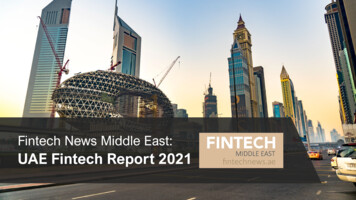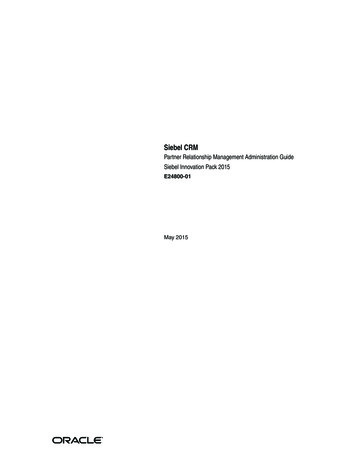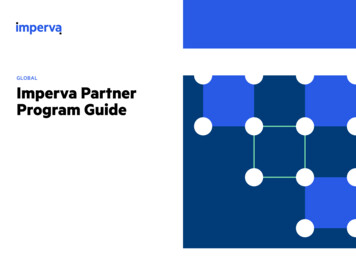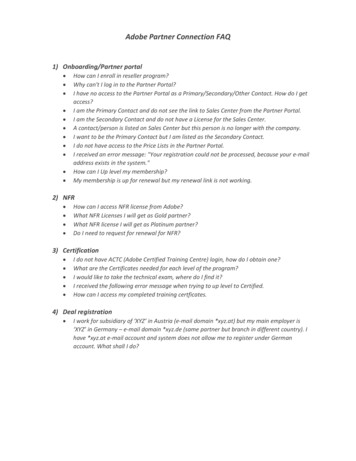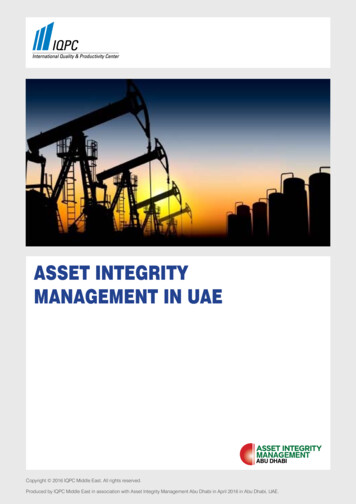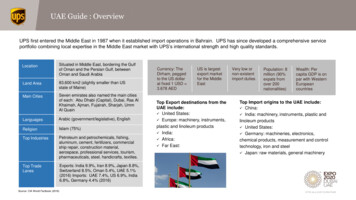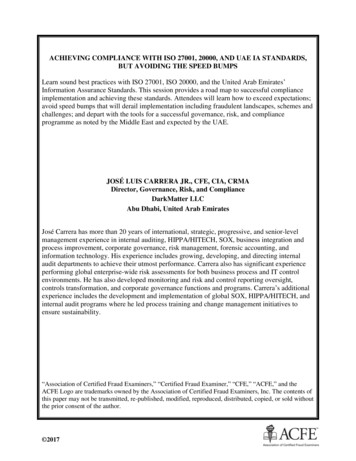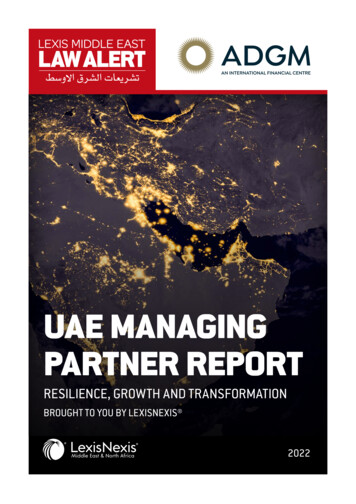
Transcription
UAE MANAGINGPARTNER REPORTRESILIENCE, GROWTH AND TRANSFORMATIONBROUGHT TO YOU BY LEXISNEXIS Middle East & North Africa2022
CONTENTSAddleshaw GoddardAndrew Johnston p7Afridi & AngellBashir Ahmed p9Al Suwaidi & CompanyMohammed R Alsuwaidi p 11Al Tamimi & CompanySamer Qudah p 13Akin GumpWael Jabsheh and Mahmoud (Mac)Fadlallah p 15AshurstDavid Charlier p 17Bird & BirdAnders Nilsson p 19BSAJimmy Haoula p 20Charles Russell Speechlys LLPPatrick Gearon FCIArb p 24Clyde & CoMark Blanksby p 26DentonsAlastair Young p 28DLA PiperPeter Somekh p 30Eversheds SutherlandGeraldine Ahern and Paul Taylor p 32Freshfields Bruckhaus DeringerMichael Hilton p 34Galadari Advocates & Legal ConsultantsAhmed Galadari p 36Global Advocacy & Legal CounselAli Al Hashimi and Mura Abidal p 38Gowling WLGTim Casben p 40Hadef & PartnersSadiq Jafar p 42Herbert Smith Freehills LLPStuart Paterson p 44HFWRichard Gimblett p 46Horizons & CoAli Ismael Al Zarooni p 48Jones DaySheila Shadmand p 50K&L GatesTony Griffiths p 52Kennedys LawPeter Ellingham p 54Morgan LewisRebecca Kelly and Bill Nash p 56Norton Rose Fulbright LLPMohammed Paracha p 60Pinsent MasonsCatherine Workman p 62Schlüter GrafAndrés Ring p 64The Lexis Middle East Law Alert magazine is producedby the LexisNexis Middle East online legal and businessresearch service. To find out if you qualify to be added toour regular circulation go to: www.lexismiddleeast.comHead of Middle East PublishingHussain Hadihussain.hadi@lexisnexis.co.ukPublisher Middle EastClaire MelvinClaire.melvin@lexisnexis.co.ukLexisNexis Middle Eastwww.lexis.aeThis product comes from sustainable forest sources.INTRODUCTIONIt was an absolute pleasure to read each and every reportsubmitted by the managing partners. Three words come tomind having digested all of the content - resilience, growth andtransformation. In my opening remarks of the 2020 managingpartner report, I spoke about the UAE legal market’s vital role in supporting the businesscommunity to get through the significant challenges that it faced. Although hurdlesremain, it is clear that the law firms we have in this region have proven how fundamentalthey are in delivering underlying strength and value to the economy. Within the firms,there has been a lot of activity and energy spent evolving working practices. Whileremote working became a necessity for some time, it seems a hybrid model offeringboth home and office based work is here to stay. That is a very good development.Remote work offers obvious benefits in terms of attraction and retention, diversity andinclusion, as well as productivity for certain aspects of work. This is being balanced withtime in the office, allowing staff to exchange ideas, operate as a team, continue a senseof community and culture, as well as allowing for ongoing training and development,particularly for junior team members. To reflect this new dynamic, many firms areoverhauling their office space, to allow for greater access to technology, as well asencouraging collaboration and creativity to thrive.For their clients, leadership teams have been incredibly busy developing andimplementing new technology, from within the firms as well as teaming up with externalproviders. Although this was already a rapidly growing area for firms, the pandemicseems to have been the rocket fuel required to instil the necessity to be digitally viableand competitive. Dealing with additional pressures and reduced budgets, clients areexpecting firms to add value via technology. It is fascinating to read about the broadrange of technology services being offered and it is an exciting area of development towatch.Now, more than ever, with the launch of Expo 2020 and the UAE’s diversificationefforts, all eyes are on our region. I am delighted to say that reflecting on thecommentary from the managing partners, it is evident that there is a lot of investmentinto the region. Sectors such as healthcare, technology and financial services arebooming. General recovery also seems to be taking place across sectors that were hithardest over the last few years, such as tourism, hospitality and retail. Firms clearly havebeen playing an even greater role as advisors in many facets that affect their clients’businesses, and this will help them to retain their clients as they partner throughout thevarious business cycles.As predicted, dispute resolution has been a continuous area of growth. Froman ADGM Courts’ perspective, we have witnessed an increase in our caseload, andparticularly in the complexity of our caseload. The ADGM Arbitration Centre hasincreased its collaboration with leading and developing disputes resolution jurisdictions,released a Protocol for Remote Hearings, as well as established a new Panel ofMediators. These initiatives have been a direct response to the requirements of thebusiness community and the trends that we are seeing in the way that disputes are beingconducted and resolved in the market. The Arbitration Centre remains committed toaligning its services to the needs of the profession and its clients by catering to fullyremote, hybrid and in-person hearings. nLinda Fitz-Alan, Registrar and Chief Executive of ADGM CourtsNovember 2021Reproduction, copying or extracting by any means of the whole orpart of this publication must not be undertaken without the writtenpermission of the publishers.This publication is intended to be a general guide and cannotbe a substitute for professional advice. Neither the authors northe publisher accept any responsibility for loss occasioned toany person acting or refraining from acting as a result of materialcontained in this publication.Cover: Getty images/iStockphoto 2021 Reed Elsevier2022 Special report Lexis Middle East Law Alert3
RESILIENCE,GROWTH ANDTRANSFORMATION Getty images/iStockphotoLaw firms continue to turn to technology to support ambitious growth plansand adapt to changing client priorities as the pace of new regulation intensifies.Hussain Hadi, Head of Publishing & Technology at LexisNexis, spoke to managingpartners about emerging trends including ESG and third-party litigation funding.4Lexis Middle East Law Alert Special report 2022
In the wake of a steady pipeline of disputes andoptimism over emerging areas of legal risk suchas cybersecurity and data protection, therewas a unifying thread of confidence across lawfirm discussions. Whether supporting their clientswith restructuring, digital transformation projects,or compliance generally, managing partners weregenerally bullish over long-term growth prospects.Ongoing economic diversification initiatives in UAEand Saudi Arabia were lauded, while new trade routeswere also referenced including Africa and China.While construction remains a key sector formany, several firms are turning their attention torapidly evolving practice areas such as healthcare.“The healthcare industry is rapidly digitising, andhealthcare data is taking on an increasingly importantrole which raises issues around access, security, AIand ethics. Following on from COVID 19 there is also arenewed focus by governments on healthcare supplychains, which is leading to increased regulation inthe industry,” said Michael Hilton of Freshfields. “Weexpect all of this to intensify as we head into 2022,with traditional incumbents increasingly challengedby disruptors and rapidly changing technology addingto the complexity of our clients’ needs,” he added.was echoed by Geraldine Sutherland of EvershedsSutherland: “Our UAE offices are embracing hybridworking structures which involved two or three daysworking in the office per week and the other daysworking from home.” A similar balance was cited byfirms including Gowling, HFW, Kenndys, and HerbertSmith Freehills. Anders Nilson of Bird & Bird said:“In principle, 50% of the working week can be doneremotely, always subject however to the needs ofclients, colleagues or the team the employee is amember of.”While all firms spoke of the importance offlexibility, advocacy firms including Horizons & Co andGlobal Advocacy & Legal Counsel, tended to placegreater importance on face-to-face interaction. Forsome firms like BSA Ahmad Bin Hezeem & Associatesthis even meant an expansion of office space.A recurring theme was adapting the office spaceto meet a post pandemic world. “Like many firms, weare closely re-evaluating our future infrastructureneeds, opting for modern, technologically advancedspaces that support more flexible working styles andencourage greater collaboration,” said Peter Somekh,DLA’s Regional Managing Partner.TECHNOLOGY ACCELERATIONESG FOCUSFirms are increasingly looking to help clientsunderstand the risks around the growth ofEnvironmental, Social and (Corporate) Governance(ESG). “In the last few years we’ve seen a profoundshift in client focus on ESG issues, driven in partby investor and societal pressure. Policymakers,investors and businesses are all increasinglyrecognising the need to ‘build back better’ in the wakeof COVID 19 which has created a sense of urgency likenever before,” said Michael Hilton of Freshfields.Peter Somekh of DLA Piper added: “In-Houselegal teams have always played an important role inmanaging social, ethical and environmental issues fororganisations. However, now they are no longer justreacting to SESG issues, but are proactively becominginvolved in driving the organisation’s SESG approach.”ESG was on the internal agenda for several firmsincluding BSA and Ashurst. Samer Qudah of Al Tamimisaid: “We have Environmental, Social and CorporateGovernance (ESG) firmly on our radar. Ensuring wehave the right ESG practices, strategy and score issomething we will work towards in 2022, as this willensure our stakeholders are provided with insightswhich can create long-term value to our clients andbuild lasting relationships with all our stakeholders.”FLEXIBILITY HERE TO STAYThe hybrid working model is clearly here to stay inthe UAE’s legal sector. “We have embraced a hybridworking model, with the aim of most staff spendingabout 60% of their time in the office and 40% at homeor elsewhere,” said David Charlier of Ashurst. This2022 Special report Lexis Middle East Law AlertBeyond the expected deployment of systems andtools to facilitate flexible working, law firms continueto accelerate their adoption of legal technologysolutions. “There is an increased need for (andexpectation of) ‘data-driven lawyers’ that reallyunderstand how to consume large quantities of data,parse them for what matters most, and insightfullyinterpret that selective content in the context of theclient’s specific business needs,” said Wael Jabseh ofAkin Gump.This theme was echoed by Alastair Young ofDentons: “We have been investing heavily in data in anumber of areas, including our new Helix division, andusing robotics for data management. At the heart ofthe strategy is increasing the use of structured dataacross the firm, allowing us to better manipulate thisdata for more consistent management outcomes.Law firms regularly sit on troves of data but do notmake the most of it – and we aim to change this.”David Charlier of Ashurst cited the benefits ofleveraging technology to more efficiently provide legalservices, including through document automationand the use of AI and analytics in large transactions,regulatory investigations and disputes. Otherexamples of internally developed projects includedCharles Russell Speechlys’ bespoke document reviewplatform (Discovery on Demand), in collaborationwith Grant Thornton, which facilitates early caseassessment.DISPUTES CONTINUEDisputes arising from financial or contractualrestructuring – largely driven by supply chain disputes5
DISPUTE TRENDS“There has also been an increase in clients opting for the paymentorder option as it is an expedited form of judgment that can beobtained on an ex parte basis, which means businesses do not haveto engage in lengthy disputes, where a claim is supported by writtenevidence that the debt is accepted or acknowledged by the debtor.”Ahmed Galadari, Galadari“We also expect to see an uptick in construction disputes work, a lotof projects in certain jurisdictions (especially Kuwait) were impactedby COVID 19 related travel restrictions, which delayed some projectsby a year or more which is now generating contractor claims anddisputes.”Richard Gimblett, HFW“The evolution and emergence of environmental justice has alsobecome a trend in 2021, especially in impacting disputes related toenergy and climate change, COVID 19 and pollution. We expect thatenvironmental justice will open the floodgates to a large number ofclaims both before the courts and arbitration centres.”Peter Ellingham, Kennedys“We have seen a shift in some types of litigation and the majorityof post-COVID-19 cross-border litigation cases were either adisruption in a supply chain triggering an alleged inability to perform,failure to deliver goods and/or services as a result of governmentinterventions, and allegations of party’s failure to adequatelymitigate against a pandemic.”Rebecca Kelly, Morgan Lewis– have kept law firms busy in 2021. For Samer Qudahof Al Tamimi, the main litigation trends can besummarised under four categories:z COVID-19 related casesz Insolvency cases and large restructuringsz Big corporate lending defaultz Liquidation of SMEsUnsurprisingly, employment disputes havecontinued. “As companies begin revamping theirlabour forces, we have seen a number of disputesrelating to ‘team moves’ and attempts to enforcerestrictive covenants to stop employees switchingjobs,” said Bashir Ahmed of Afridi & Angell. Sadiq Jafarof Hadef added: “Employment disputes continue toevolve and grow as a result of business restructuring.These include commission-based claims, as well asseverance and termination claims.”COUNTING ON CONSTRUCTIONAccording to Sadiq Jafar of Hadef & Partners: “In theconstruction sector, constricted cash flow has led toa rise in the call of bonds and a consequent increasein arbitrations involving the underlying disputes. Majorplayers, such as Arabtec Holding PJSC, which was oneof the largest construction contractors in the UAE,filed for liquidation. The effects of this constrained6liquidity, and related restructurings and insolvencies,will continue to be felt by the UAE constructionindustry over the coming period.”Ali Ismael Al Zarooni of Horizons & Co expectsthat the majority of disputes in 2022 will continue tobe related to construction and real estate and said:“Lately the firm has been inundated with constructionrelated disputes, with many contractors complainingof payment delays and unlawful terminations of theirrespective contracts.”Meanwhile, Jimmy Haoula of BSA noted a rise inmitigation in the construction sector, as companieslook to renegotiate terms and find a favourablesolution out of the courts. Mark Blanksby of Clyde& Co said: “We have also seen significant activity inthe construction sector. Although a wave of disputesis yet to emerge, currently we are seeing a moreaggressive approach to handling existing disputes,perhaps reflecting the potential significance of theoutcome of disputes on businesses hit hard by thepandemic.”Alastair Young of Dentons was also cautiousabout long-term trends: “We deal with a lot of largeinfrastructure project disputes across the GCC andbeyond. We believe that is going to continue well intonext year, but I think there is also a question aroundthe longevity of the construction dispute market. Itwill not change dramatically in the UAE, where theconstruction dispute market has been particularlyactive, but there are not so many big projectshappening now as there have been in the last three tofour years.”THIRD PARTY FUNDINGFunded claims in the UAE are increasing dramaticallyaccording to Andrew Johnston of AddleshawGoddard, who said: “We have seen increased interestfrom clients to secure litigation funding for DIFC Courtactions and arbitrations, and from funders to fundclaims.” This was echoed by Jimmy Haoula, ManagingPartner at BSA, who said: “Companies are proactivelyengaging with third party funders to aid cash flow, layoff the cost of litigation and monetise valuable assets.Funding is increasingly part of the strategy in advance,rather than an afterthought, and can help companiesunderstand their position and objective in pursuinglitigation from the get-go.”Tony Griffiths, Managing Partner, K&L GatesMiddle East noted that third-party funding is nowregulated by both DIFC and ADGM, and added:“Third-party funding allows businesses to manage riskassociated with the cost of legal claims, but it is alsoon the rise as it can help insolvent, distressed or cashpoor parties to fund disputes to recover receivables.”Charles Russell Speechlys has responded to thetrend by creating a funding product called ‘Feesible’to assist clients with funding options for disputeresolution including conditional or damage basedagreements, as well as third party funding. nLexis Middle East Law Alert Special report 2022
BASHIR AHMED, MANAGINGPARTNER, AFRIDI & ANGELLBashir Ahmed joined Afridi & Angell in 1988 and was elected managing partnerin 2016. He has spent the majority of his career in the UAE at Afridi & Angellduring which time he has played a key leadership role including as head of thefirm’s Corporate/M&A, Banking and Finance and Shipping practice groups. Amulti-specialist practitioner, Bashir advises on banking, corporate and contentiousmatters. He has extensive experience in domestic and cross-border acquisitionsand advises clients on general corporate matters. He also advises internationaland domestic banks on a wide range of matters including loan and credit facilities,syndications and regulatory matters. His maritime practice involves advising shipowners and P&I Clubs, dry docks and ship repair companies on contentious andnon-contentious matters.WHAT LONG-TERM REMOTE / FLEXIBLE WORKINGPRACTICES WILL YOU MAINTAIN OR EXPAND UPON?HAVE YOU MADE (OR ENVISAGE MAKING) ANYLONG-TERM CHANGES TO YOUR OFFICE SPACE?At Afridi & Angell we have not made any formallong-term remote or flexible working practices norhave we made or envisage making any long-termchanges to our office space. Having said that, all ourlawyers and staff have the ability to work remotelyand several choose to work from home occasionally.“WE ARE SEEING A RENEWEDFOCUS ON COMPLIANCEIN THE UAE AND WEEXPECT THERE WILL BEMORE BANKRUPTCIESAND RESTRUCTURINGSAS A RESULT OF LASTYEAR’S DIFFICULTFINANCIAL CLIMATE ANDNON-COMPLIANCE.”Given the size of the firm where the majorityof our staff are located in the Dubai office, we didnot feel the need to formalise a remote or a flexibleworking practice. Afridi & Angell has always enjoyed2022 Special report Lexis Middle East Law Alerta collegial environment where people work closelytogether and in teams. It is this very quality that setsthe firm apart. When choosing to be in the office orwork remotely, we trust everyone in the firm to applygood judgement as to what is in the best interest ofour clients. Certain tasks can be and perhaps arebetter accomplished remotely. Others will requireclose consultation with other colleagues and partnersand are better performed physically in the office.I would add there is no substitute to physicalinteraction when seeking a productive discussion,a good exchange of ideas, and, let us not forget,continuous learning and development especially forjunior lawyers and staff. Although technology hasplayed a vital role in bridging the ‘remote’ gap, it is nota substitute for physical interaction.WHAT IS NEW WITH YOUR FIRM AND WHAT ARE YOURPLANS FOR 2022?As mentioned in last year’s survey, our primary focusfor 2021 and beyond is to upgrade existing IT, investingin new technology and acquiring talent in key areas ofgrowth.We have started upgrading our existing IT systemsand added to the overall headcount by hiring severaltransactional and dispute resolution lawyers. Thisprocess will continue throughout 2022.In addition, we will invest in data and voicecollaborative infrastructure in order to facilitateefficient working teams, while at the same timeinvesting in additional security infrastructure in orderto safeguard against cybersecurity threats.9
We will also invest in additional managementreporting and the further customisation of ourpractice management systems in order to assistpartners and senior associates in handling clientfiles efficiently and maximising revenue from eachengagement.WHICH PRACTICES DO YOU SEE GROWING IN 2022?WHAT ARE THE DRIVERS BEHIND THAT?The difficult economic climate we had last yearcoupled with an unprecedented number of newlaws in the UAE and amendments to existingones, have disrupted some businesses but havealso created opportunities for new businesses.This has resulted in a surge in the restructuringand insolvency, general compliance and disputeresolution practices.We have had a very busy year advising on highprofile bankruptcy and restructuring matters,including the NMC debacle, the Wirecard scandal,and a number of bankruptcies and restructuringsin the oil and gas sectors. We are seeing a renewedfocus on compliance in the UAE and we expectthere wil be more bankruptcies and restructuringsas a result of last year’s difficult financial climateand non-compliance. Anti-trust is a continued areaof growth and we consider ourselves the marketleading firm in that practice. This growth is driven byglobal M&As and consolidations which have beenon the rise since the latter part of 2020. Litigationand dispute resolution, both onshore and in theDIFC, have also been on the rise and will continue togrow. The post COVID-19 environment has resultedin parties going after commercial and financiallosses suffered in last year’s difficult climate. Theresurgence of the labour force post COVID-19 hasbrought more disputes related to ‘team moves’where Afridi & Angell has been involved in advisingon a number of high value matters. The postCOVID-19 environment has also brought with itmore disputes involving online transactions and weanticipate this trend to continue on the rise.TO WHAT EXTENT IS TECHNOLOGY CHANGING THEWAY YOU INTERACT WITH YOUR CLIENTS, AND THESERVICES YOU PROVIDE THEM?The majority of our clients have moved quickly toadopt technology (including electronic documentsand electronic authentication) and hybrid workingpractices as the new norm of doing business.COVID-19 has also accelerated the ‘smart’transformation process that was being introducedby the UAE government to enable services to beavailable anytime, anywhere. As a trusted advisor itis our duty and obligation to stay nimble and keeppace with technology and other changes adoptedby our clients. Using technology has generallyhad a positive effect on providing services toclients. There has been a shift from physical to10virtual meetings even when a physical meeting ispossible. Increasing numbers of clients are alsoreplacing telephone calls and e-mails with virtualmeetings. Eliminating the time and cost of traveland having the option of being more inclusive ofglobal teams has prompted many clients and theiradvisers to use this technology as the preferredcommunication norm; and it is here to stay. This inturn has prompted a faster turnaround of servicesand increased the numbers of matters we areretained on at any time.“THE POST COVID 19ENVIRONMENT HASBROUGHT MORE DISPUTESINVOLVING ONLINETRANSACTIONS”WHAT DISPUTES / LITIGATION TRENDS HAVE YOUOBSERVED IN 2021?We have seen an increase in disputes in all forumsas clients attempt to resolve the many issuesarising from COVID-19. As companies beganrevamping their labour forces, we have seen anumber of disputes relating to ‘team moves’ andattempts to enforce restrictive covenants to stopemployees switching jobs. Regulatory actionswhich began in the aftermath of the collapse ofa number of large financial services providersprior to COVID-19 have now reached their finalstages, and this has led to a number of challengesto the regulators before various forums, includingthe financial markets tribunal and the DIFCCourts. Disputes related to online transactions,competition and antitrust, and contentiousagency advice are also on the rise this year.Litigation before the DIFC Courts continues to risetoo as clients continue to opt into the DIFC as apreferred forum for dispute resolution.WHAT KEY ADVICE WOULD YOU GIVE FOR UAEBUSINESSES TO SUCCEED OVER THE NEXT 12MONTHS?Stay on top of legal developments as the UAEauthorities put more emphasis on compliance.We expect the law to evolve as rapidly to takeinto account the new virtual/remote workenvironment. These developments may includeareas such as employee and employer rights andobligations; adopting fintech and blockchain ina controlled manner; digital transmission andattestation of certain documents, and electronicsignatures. nLexis Middle East Law Alert Special report 2022
Better content. Better results. More business.The effective lawyer uses Lexis Middle EastA powerful, fully integrated online legal research tool, reimagining the practice of law in the Middle EastSAVE TIMEREDUCE RISKOne search grants access to theMiddle East’slargest and most comprehensivedatabase oflegislation, case summaries and practical contentCase summaries from 70 different courtsArabic-English translation of legislation across 20practice areasOfficial gazette indexes dating back to the 1970s12 different types of practice tools and documentsDaily legal news service covering 21 countriesPowerful search doesn’t just read the written word,it also uses context and metadata tags to find betterresultsIntelligent search recommends content based onyour search terms, short-cutting you to keylegislation, cases and practical guidanceInstant linking between research and guidance cansupercharge legal workDeep search across the widest collection of lawsand cases ensures that you build the strongestargument without missing key pointsNatural language search finds the rightresults without complicated search formsDon’t just research the law – understandhow to use it. Seamless integration betweenprimary sources and practical guidanceExclusive content, such as the Sader UAE Annotated Codes, Gulf Legal Advisor practical guidancesolution, Legislative Insights, Getting the DealThrough - Corporate Counsel Advisory & FreezonesQ&A Guides and digital access to seven regional &international law journalsAll our content is written by local and regionalpractice area experts and reviewed thoroughly byour editorial team, so you can be certainLexisNexis content is accurate and up to dateEasily search for content from across 38 MENAonshore jurisdictions and freezonesResearch is easy and intuitive for all levels ofexperienceThere is no other solution with the breadth of Lexis Middle East100,000 Documents17,500 Case Summaries5,500 Practical Guidance Documents & Tools15,000 Laws and Regulations35 Online Books3,500 Journal ArticlesFind out more https://www.lexis.ae/lexis-middle-east-law/
Akin Gump. This theme was echoed by Alastair Young of Dentons: "We have been investing heavily in data in a number of areas, including our new Helix division, and using robotics for data management. At the heart of the strategy is increasing the use of structured data across the firm, allowing us to better manipulate this
